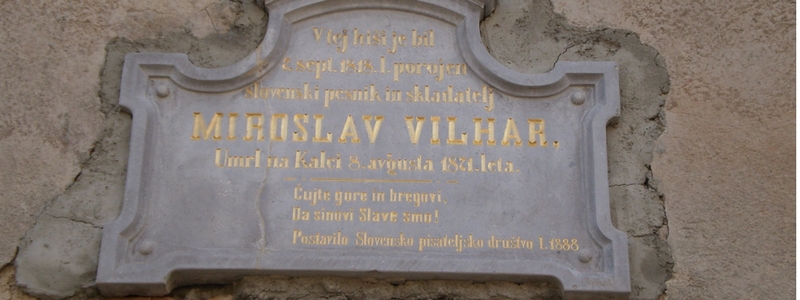The Slovenian Writers’ Association had a memorial plaque to Miroslav Vilhar attached to his birthplace in Planina in 1888. The inscription reads:
“Slovenian poet and composer
MIROSLAV VILHAR
Was born in this house
On 7 Sept 1818.
Died on the Kalec estate on 8 Aug 1871.
——————————————-
Hark, ye mountains and slopes
That we are sons of Slava!
Presented by the Slovenian Writers’ Association in 1888.”
Miroslav Vilhar
The musical works of composer, poet, playwright and politician Miroslav Vilhar (1818–1871) express his desire to foster the Slovenian national spirit. Apart from lieder, choral works and piano pieces, he wrote a singspiel Jamska Ivanka (Joanna of Predjama), considered to be an important example of nineteenth-century theatre-music written in Slovenian. His musical style oscillates between classicism and early romanticism, reflecting influences of the Italian arioso style and showing affinities for folk music.
He was born in Planina near Rakek. He first went to school in Postojna, and then attended gymnasium in Sankt Paul im Lavanttal in Carinthia and the lyceum in Ljubljana. Apart from his attested proficiency in piano, guitar and flute, little is known about his musical education. In all probability, he attended the music school of the Ljubljana elementary school for a time, being tutored by Gašpar Mašek. He studied law in Vienna and Graz. In 1843, unable to meet the high tuition costs owing to financial difficulties, his father summoned him to their home estate of Kalec between Pivka and Ilirska Bistrica.
The revolutions of 1848 in the Austrian Empire led to vehement appeals for the Slovenian language to be recognised as equal to German, and the demand for the creation of Slovenia as a distinct entity. Vilhar was politically active as a regional deputy, mayor, and organiser of the National Guard and of the Pivka Tabor, a political meeting aimed at promoting the United Slovenia movement. He shared his opinions with Fran Levstik, who taught his children at Kalec for a time. Together, they launched the newspaper Naprej (Forward), which advocated the political and language demands of the Slovenian national programme. Vilhar was incarcerated for several weeks for publishing the paper, and lost his deputy tenure.
He started to compose and write poems in Graz, gradually replacing German with Slovenian in his poetry. The first of his Slovenian poems was published in 1845 in Kmetijske in rokodelske novice (Agricultural and Artisanal News). Three years later, the band of the National Guard Ljubljana performed his Živio-polka (Salute Polka) and Polka Slovenka (Slovenian Polka). He preferred to delegate instrumentation to a more skilled musician, most probably to Gašpar Mašek, who revised his later compositions. In 1850, he published two cycles of waltzes for piano solo Milice okrogle (Gentle Ringlets) and Zvezdice slovenske okroglice (Slovenian Star Roundlets).
The three-act Jamska Ivanka received its publication that same year, a dramatic piece interspersed with songs and ensembles, or a singspiel. The popular singspiel played a prominent part in mid- and late-nineteenth-century Slovenia. Featured in programmes of the Slovenian Society, it also increased the role of music in the performance art of that day. Jamska Ivanka is an attempt at a larger national theatre-music work. It is set at the time of the Crusades, and in Predjama Castle, a location that appealed to the spectators’ emerging national identity. The story, about the friendship between young Ivanka and adoptee Bogomil, develops into a plot of ill-fated love with a happy resolution. The musical passages serve to comment on the events in a light tone. The song Pozdrav domovini (Salutation to the Homeland) is addressed to the resilient Slovenian people, although not utilising national or Slavic melodicism in its music, but containing elements of Italian belcanto and early German romantic music.
Over that same period, Vilhar set to music his own text, Vesolnimu svetu (To the Whole Wide World), which displays more developed harmonic language. There followed three volumes of lieder and choral compositions, mostly set to Vilhar’s poems. With his revisions, Fran Levstik greatly contributed to the development of Vilhar’s poetry. It was thus also Levstik who takes credit for Vilhar’s tunes entering the national folk-song repertoire, e.g. Na jezeru (On a Lake) and Planinarica (Mountaineer).
Miroslav Vilhar’s creativity proceeded from simple dance pieces to lieder, some of which became part of the national folk-song canon on account of their melodic and harmonic simplicity. While not composing works of international relevance, he produced a diverse output of dance pieces, romantically flavoured songs, simple stanzaic tunes and theatre music. He provided a cultural foundation to Slovenian identity, a platform from which musical and literary legacies stemmed.
Lev Fišer

